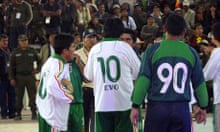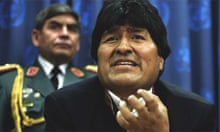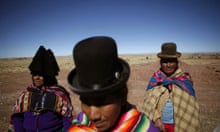The second time the bus broke down we were just 60 km shy of Cochabamba, a city of half a million people in central Bolivia. The sun was falling down behind the mountains, and two of the Argentines had started a fire by the side of the road. Before long, as we waited for a few taxis to ferry us the rest of the way, a round of singing had broken out around the impromptu campfire. To the tune of La Bamba some improvised lyrics were hashed out, and before long we were all singing along to our new version: "To Cochabamba!" After a few rounds our new ride showed up, and we finally made it down to the dusty city in the valley below, where a historic gathering drawing as many as 20,000 environmental activists, government representatives, and journalists from all over the world is set to commence this week.
The World People's Conference on Climate Change and the Rights of Mother Earth, running from April 20-22, is organised by the Bolivian government after the widely acknowledged negotiating failures of the UN-sponsored climate meetings in Copenhagen last December. In both spirit and in structure, the Cochabamba meeting is meant to give greater voice to civil society, indigenous groups, and those who hail from countries most impacted by the effects of climate change. The serendipitous band of activists, teachers, scientists and journalists, from seven different countries, who I joined on a two-day overland trek from Buenos Aires to Cochabamba (3,000 km), could be seen as a microcosm of sorts. The varied work of many of the bus riders reflects the multifaceted roots of climate change, as well as the kinds of diverse grassroots organising efforts that will be highlighted at the conference.
"We plan to participate in the working group on a climate tribunal, the idea to lay down a clear picture of who is responsible," Enrique Schwartz told me, a Chilean who works with a Buenos Aires based human rights group. "It grows out of what we see so many transnational companies doing in so many of our communities."
Enrique and his colleague Agostina Chiodi work with residents of a neighbourhood on the outskirts of Buenos Aires called Villa Inflamable – literally, "inflammable village". The neighborhood was thus named because it is surrounded by dozens of refineries and chemical plants, all of which were built after the neighborhood was established. The water in the nearby river has been known to burst in to flames at times, according to Agostina, and neighborhood kids have been found to have high traces of benzene and lead in their blood. The Argentine affiliate of Royal Dutch Shell is the owner of the largest nearby facility.
"We really want to look at the big picture, to see how the financial sector is intertwined with these transnational companies," says Agostina. "Who loans money to Shell? And can they be held accountable for what it's doing in this neighbourhood?"
Alejandro Yanniello works with an environmental group in Patagonia called Piuké, which means "Heart" in the language of the Mapuche, the indigenous people who live in the south of Chile and Argentina. A lot of the work Alejandro engages in he describes as "climate change literacy". He also works part-time as a local tour guide, which sometimes gives him the opportunity to use dramatic visual aids in his work.
"Recently I showed around a couple in their 60s who came to see the glaciers down south. Fifty years ago they travelled there on their honeymoon, and this time they were completely shocked. They said that the glacier used to reach all the way to where there is now a big lake. And of course they were right – in Argentina our glaciers are melting."
Alejandro and everybody else found their way to the climate bus via Tony Phillips, a native of Dublin now residing in Buenos Aires. A similar climate caravan that travelled through Europe for the climate meetings last year en route to Copenhagen inspired him.
"The idea was a means to an end, clearly to get people there," Tony told me during one of the many rest stops along the way. "But I also loved this idea of having a sort of mobile ecological university, where people could learn from each other, and get to know each other on the way to Bolivia."
In the north of Argentina we picked up Pablo Dominguez and Manuel Barraco, two young environmental activists from a town in the province of Catamarca called Andalgala. In a conversation over mate, the ubiquitous herbal brew, the two described what they see as a direct line between the Canadian mine company that has set up shop in the mountains above their town, and the huge amounts of carbon emissions created by the extractive industry in general.
"The mine company has 100 trucks – and they all use the same amount of gas every hour that a car burns through in a year. We live out in the country, but the mine is emitting as much CO2 as a big city."
Pablo and Manuel were involved in a grassroots uprising earlier this year, after it had been revealed last year that the mine had acquired the rights from the provincial government not only to dig in the mountains above, but underneath people's homes in the city as well. At the end of 2009, hundreds of townspeople set up a 24-hour-a-day blockade of the main road leading up to the mine. Things reached a boiling point earlier this year, after a number of marches in town where thousands of people had come out to protest the mine. On 15 February the mayor sent in dozens of police to break up the roadblock.
"In the afternoon people did a sit-in on the road, and the police arrested dozens of us," Pablo told me, who was also arrested and jailed that day. "After that they started shooting at people with rubber bullets and gas. Then they opened up the road to let a bulldozer drive up to the mine. It was surreal – just like Avatar."
Speaking of which, it is rumoured that Avatar director James Cameron will be in Cochabamba. As the bus rolled through the lush landscape in southern Bolivia, its passengers laughed together and talked about how to get Cameron to visit the town of Andalgala.




